Thesis: Roles of Stakeholders in School Improvement and Management
VerifiedAdded on 2023/06/10
|24
|4962
|109
Thesis and Dissertation
AI Summary
This thesis examines the impact of stakeholder involvement on school improvement, focusing on a case study at Hithadhoo School. The research investigates the roles of parents, teachers, and students in enhancing educational outcomes. Data analysis includes both quantitative and qualitative methods, such as surveys and interviews, to explore themes related to stakeholder engagement, parental supervision, extra-curricular activities, and teacher-parent communication. Key findings reveal the positive impact of stakeholders on student education, the importance of parental supervision, and the influence of extra-curricular activities on academic performance. The thesis also addresses challenges related to stakeholder engagement and offers recommendations for future research, emphasizing the need for a balanced approach to academic and extra-curricular activities and effective communication between stakeholders. Graphs and tables are used to present the data and findings, supporting the analysis with relevant literature reviews.
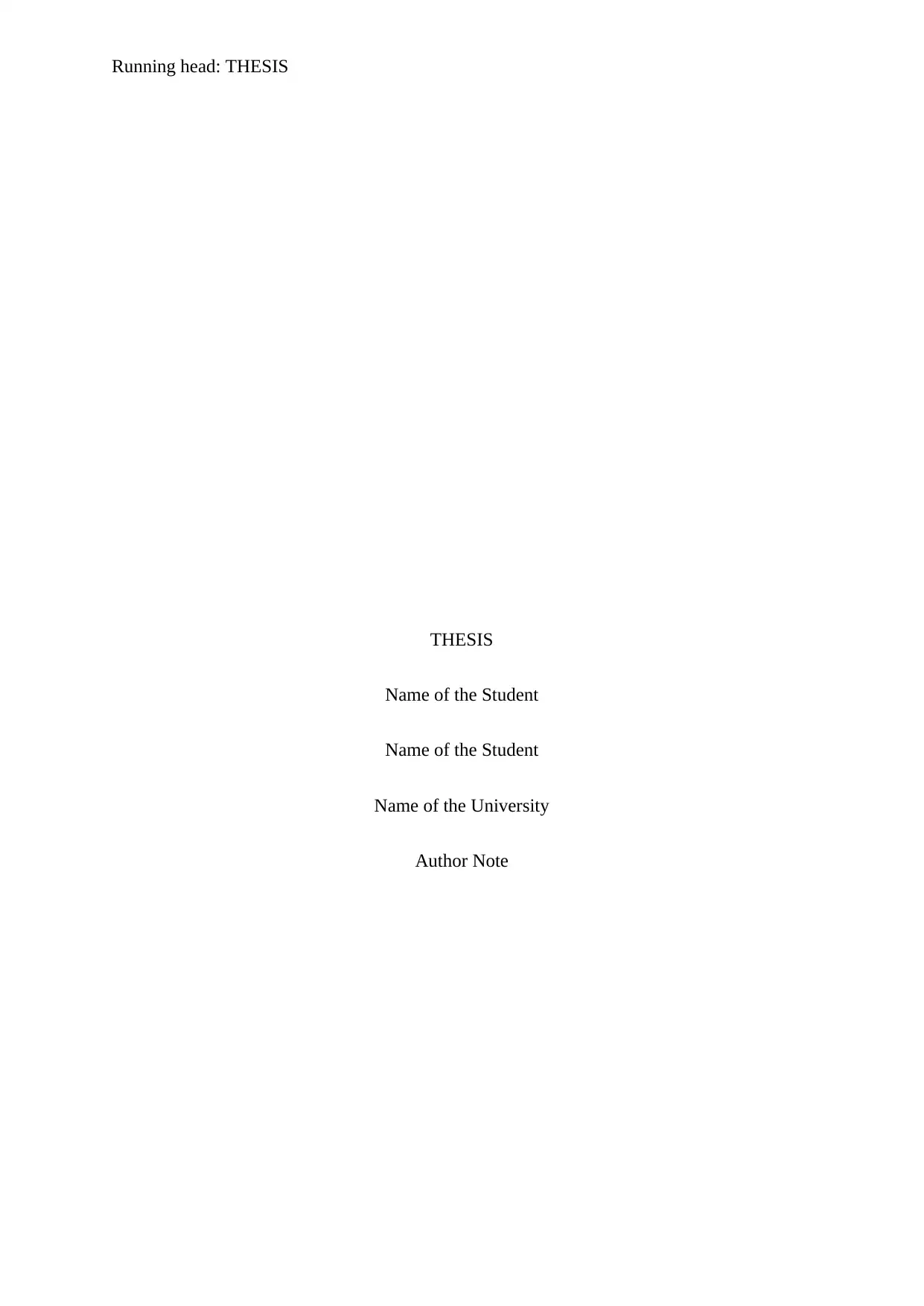
Running head: THESIS
THESIS
Name of the Student
Name of the Student
Name of the University
Author Note
THESIS
Name of the Student
Name of the Student
Name of the University
Author Note
Paraphrase This Document
Need a fresh take? Get an instant paraphrase of this document with our AI Paraphraser
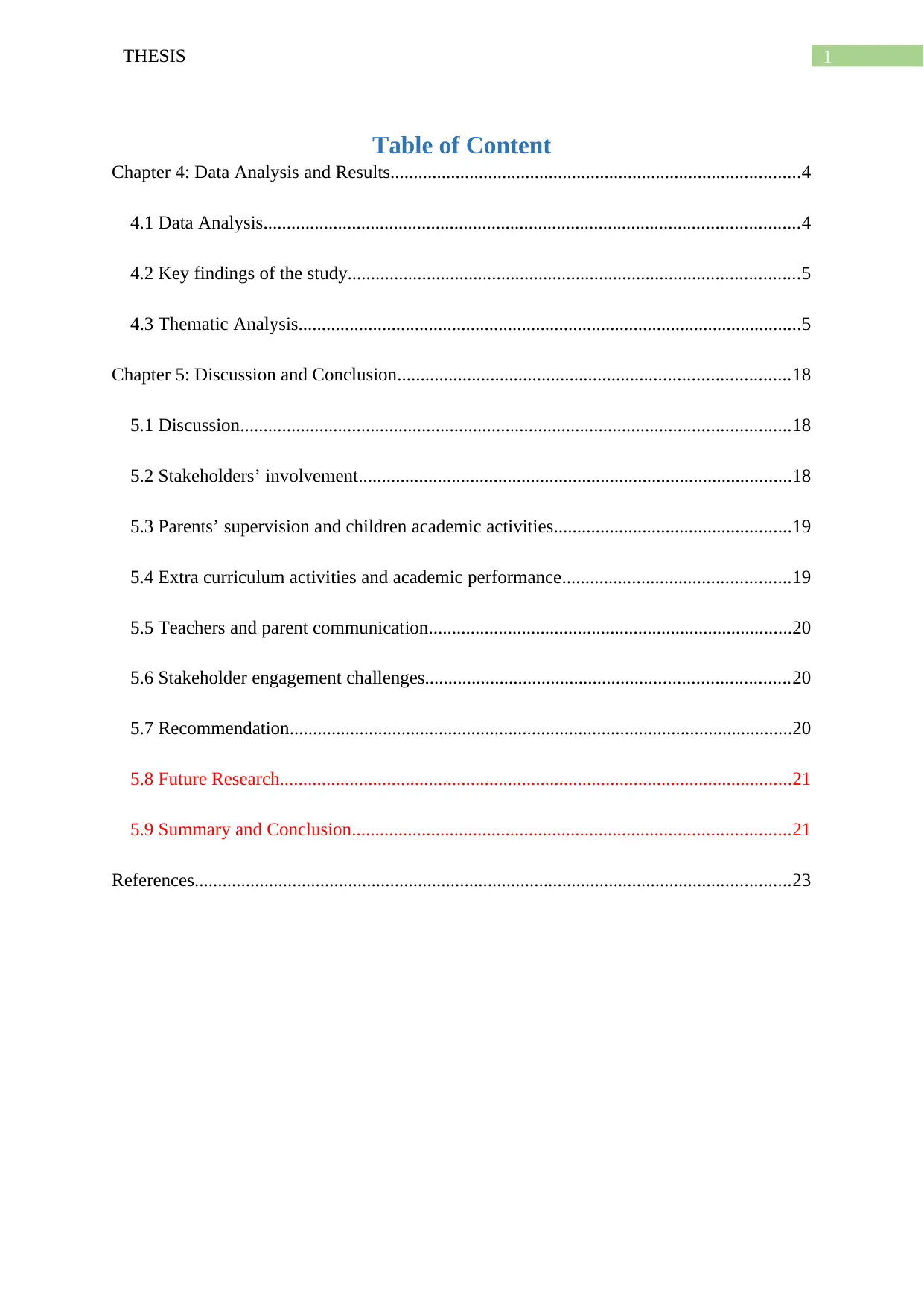
1THESIS
Table of Content
Chapter 4: Data Analysis and Results........................................................................................4
4.1 Data Analysis...................................................................................................................4
4.2 Key findings of the study.................................................................................................5
4.3 Thematic Analysis............................................................................................................5
Chapter 5: Discussion and Conclusion....................................................................................18
5.1 Discussion......................................................................................................................18
5.2 Stakeholders’ involvement.............................................................................................18
5.3 Parents’ supervision and children academic activities...................................................19
5.4 Extra curriculum activities and academic performance.................................................19
5.5 Teachers and parent communication..............................................................................20
5.6 Stakeholder engagement challenges..............................................................................20
5.7 Recommendation............................................................................................................20
5.8 Future Research..............................................................................................................21
5.9 Summary and Conclusion..............................................................................................21
References................................................................................................................................23
Table of Content
Chapter 4: Data Analysis and Results........................................................................................4
4.1 Data Analysis...................................................................................................................4
4.2 Key findings of the study.................................................................................................5
4.3 Thematic Analysis............................................................................................................5
Chapter 5: Discussion and Conclusion....................................................................................18
5.1 Discussion......................................................................................................................18
5.2 Stakeholders’ involvement.............................................................................................18
5.3 Parents’ supervision and children academic activities...................................................19
5.4 Extra curriculum activities and academic performance.................................................19
5.5 Teachers and parent communication..............................................................................20
5.6 Stakeholder engagement challenges..............................................................................20
5.7 Recommendation............................................................................................................20
5.8 Future Research..............................................................................................................21
5.9 Summary and Conclusion..............................................................................................21
References................................................................................................................................23
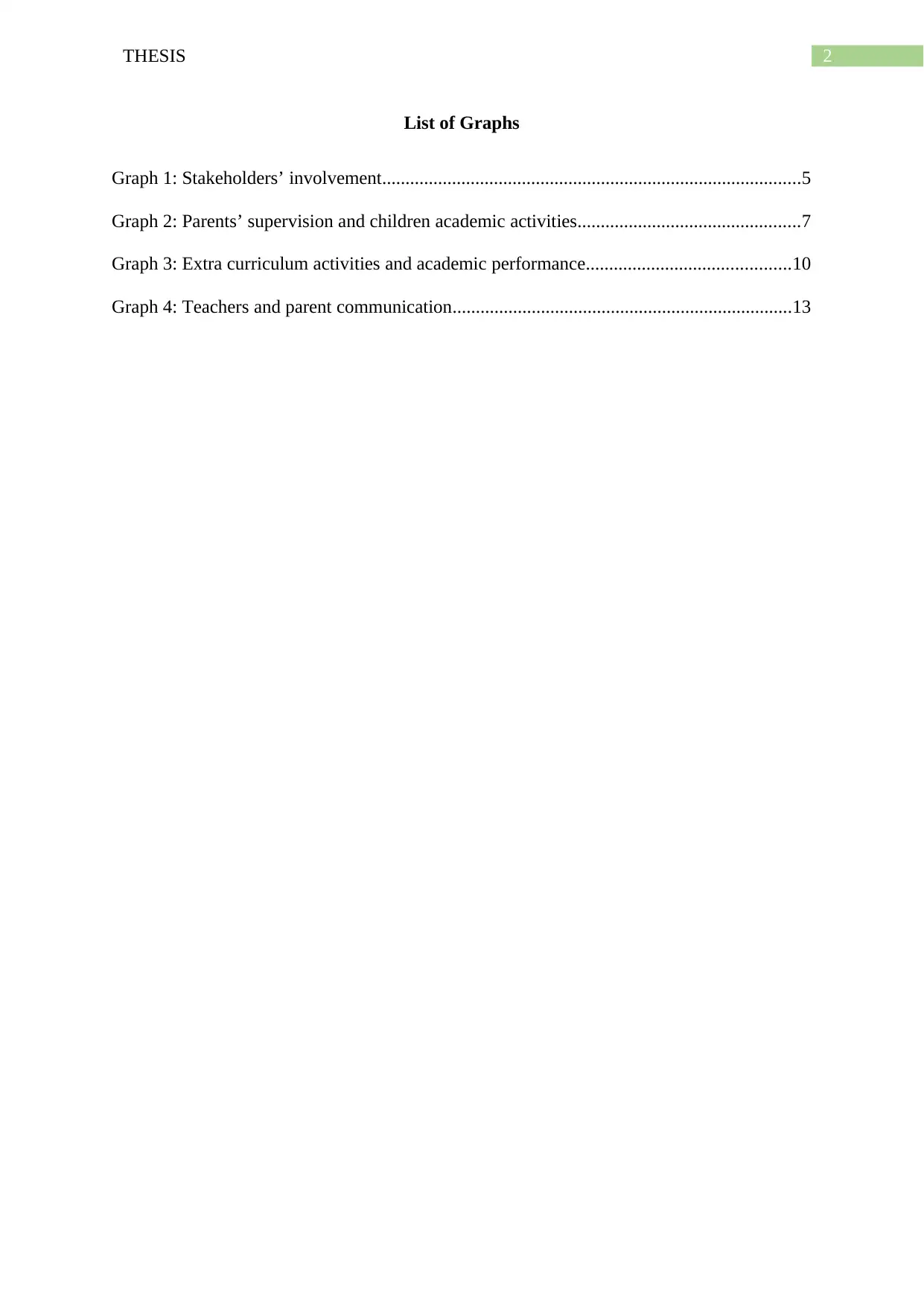
2THESIS
List of Graphs
Graph 1: Stakeholders’ involvement..........................................................................................5
Graph 2: Parents’ supervision and children academic activities................................................7
Graph 3: Extra curriculum activities and academic performance............................................10
Graph 4: Teachers and parent communication.........................................................................13
List of Graphs
Graph 1: Stakeholders’ involvement..........................................................................................5
Graph 2: Parents’ supervision and children academic activities................................................7
Graph 3: Extra curriculum activities and academic performance............................................10
Graph 4: Teachers and parent communication.........................................................................13
⊘ This is a preview!⊘
Do you want full access?
Subscribe today to unlock all pages.

Trusted by 1+ million students worldwide
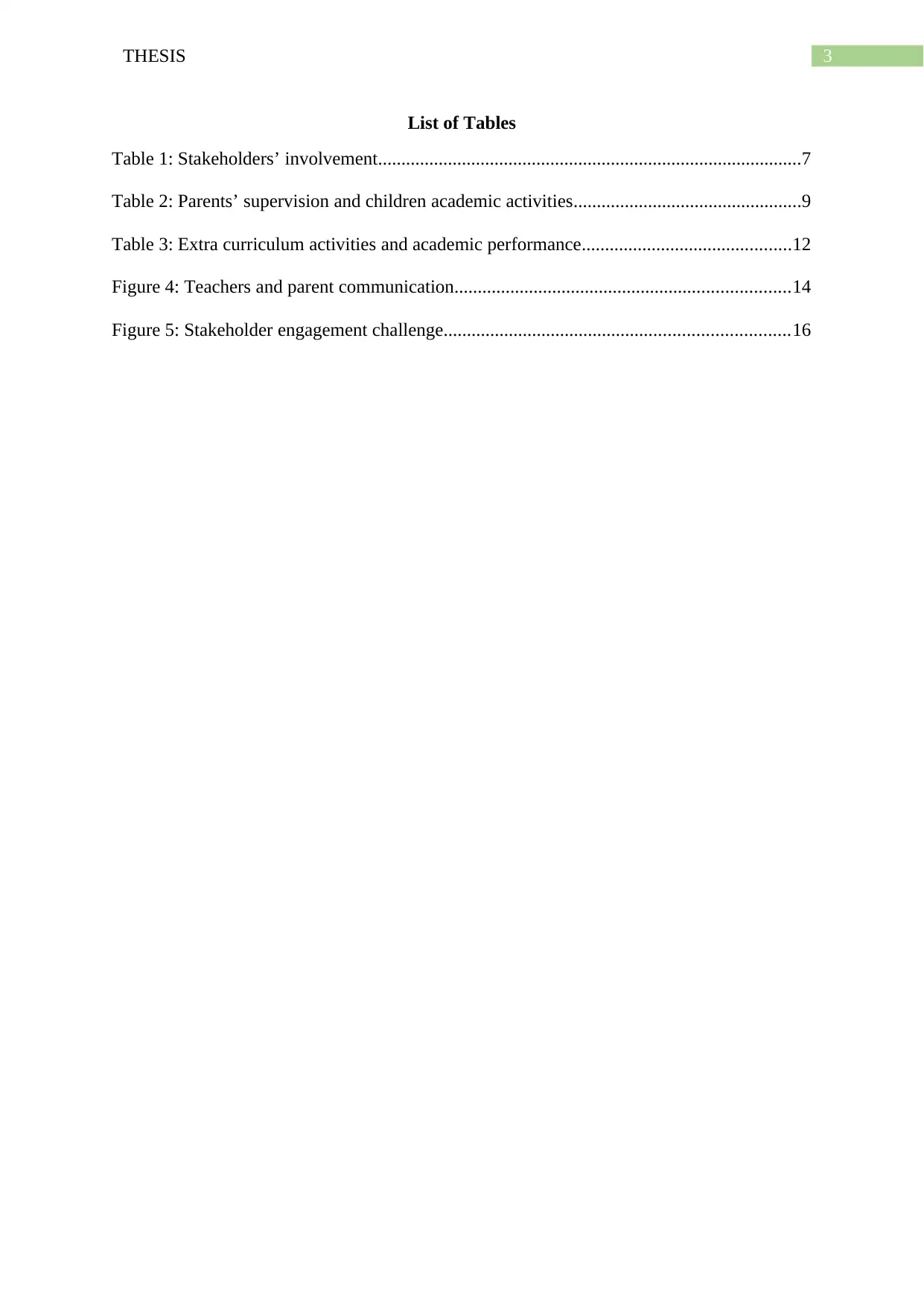
3THESIS
List of Tables
Table 1: Stakeholders’ involvement...........................................................................................7
Table 2: Parents’ supervision and children academic activities.................................................9
Table 3: Extra curriculum activities and academic performance.............................................12
Figure 4: Teachers and parent communication........................................................................14
Figure 5: Stakeholder engagement challenge..........................................................................16
List of Tables
Table 1: Stakeholders’ involvement...........................................................................................7
Table 2: Parents’ supervision and children academic activities.................................................9
Table 3: Extra curriculum activities and academic performance.............................................12
Figure 4: Teachers and parent communication........................................................................14
Figure 5: Stakeholder engagement challenge..........................................................................16
Paraphrase This Document
Need a fresh take? Get an instant paraphrase of this document with our AI Paraphraser
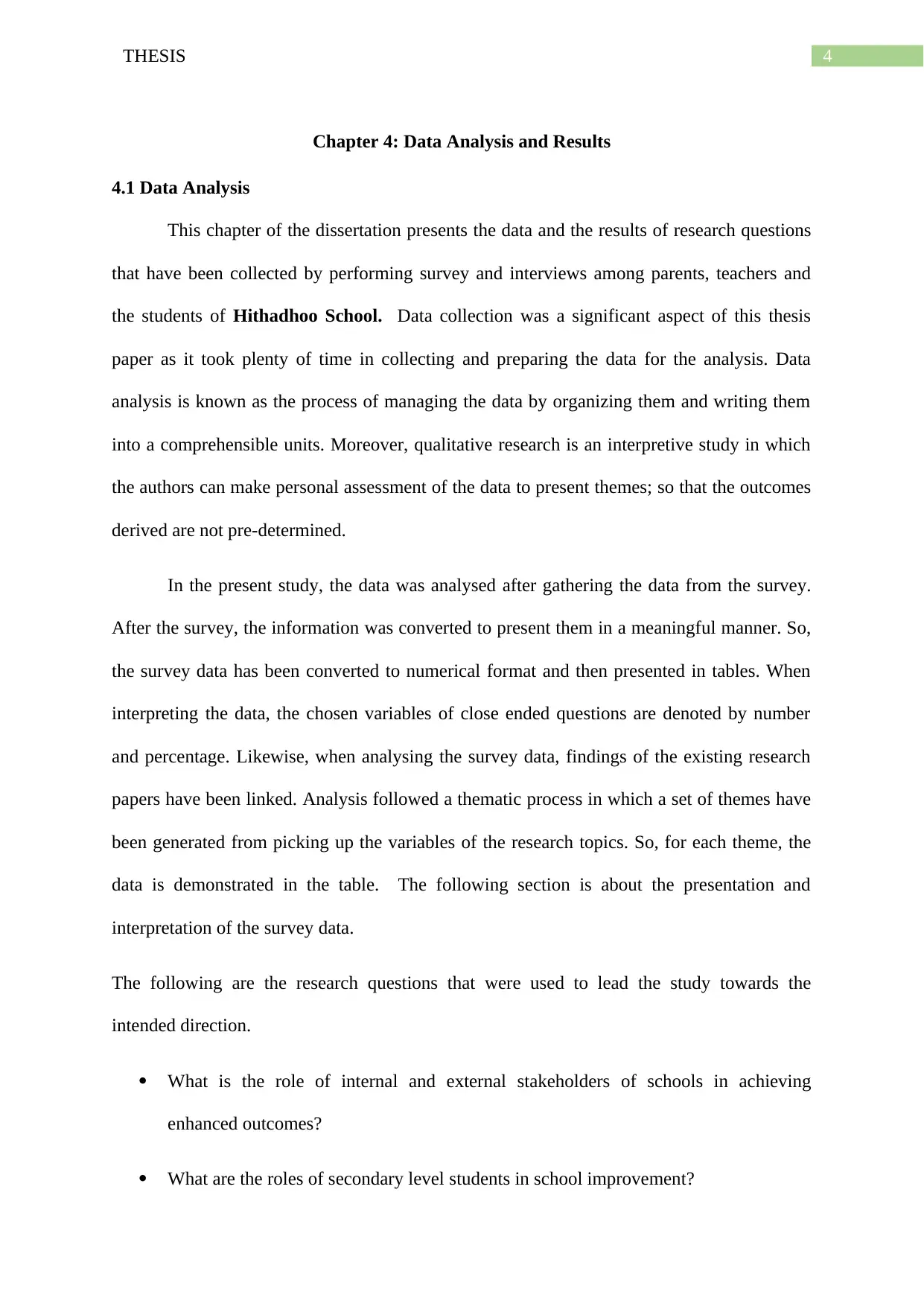
4THESIS
Chapter 4: Data Analysis and Results
4.1 Data Analysis
This chapter of the dissertation presents the data and the results of research questions
that have been collected by performing survey and interviews among parents, teachers and
the students of Hithadhoo School. Data collection was a significant aspect of this thesis
paper as it took plenty of time in collecting and preparing the data for the analysis. Data
analysis is known as the process of managing the data by organizing them and writing them
into a comprehensible units. Moreover, qualitative research is an interpretive study in which
the authors can make personal assessment of the data to present themes; so that the outcomes
derived are not pre-determined.
In the present study, the data was analysed after gathering the data from the survey.
After the survey, the information was converted to present them in a meaningful manner. So,
the survey data has been converted to numerical format and then presented in tables. When
interpreting the data, the chosen variables of close ended questions are denoted by number
and percentage. Likewise, when analysing the survey data, findings of the existing research
papers have been linked. Analysis followed a thematic process in which a set of themes have
been generated from picking up the variables of the research topics. So, for each theme, the
data is demonstrated in the table. The following section is about the presentation and
interpretation of the survey data.
The following are the research questions that were used to lead the study towards the
intended direction.
What is the role of internal and external stakeholders of schools in achieving
enhanced outcomes?
What are the roles of secondary level students in school improvement?
Chapter 4: Data Analysis and Results
4.1 Data Analysis
This chapter of the dissertation presents the data and the results of research questions
that have been collected by performing survey and interviews among parents, teachers and
the students of Hithadhoo School. Data collection was a significant aspect of this thesis
paper as it took plenty of time in collecting and preparing the data for the analysis. Data
analysis is known as the process of managing the data by organizing them and writing them
into a comprehensible units. Moreover, qualitative research is an interpretive study in which
the authors can make personal assessment of the data to present themes; so that the outcomes
derived are not pre-determined.
In the present study, the data was analysed after gathering the data from the survey.
After the survey, the information was converted to present them in a meaningful manner. So,
the survey data has been converted to numerical format and then presented in tables. When
interpreting the data, the chosen variables of close ended questions are denoted by number
and percentage. Likewise, when analysing the survey data, findings of the existing research
papers have been linked. Analysis followed a thematic process in which a set of themes have
been generated from picking up the variables of the research topics. So, for each theme, the
data is demonstrated in the table. The following section is about the presentation and
interpretation of the survey data.
The following are the research questions that were used to lead the study towards the
intended direction.
What is the role of internal and external stakeholders of schools in achieving
enhanced outcomes?
What are the roles of secondary level students in school improvement?
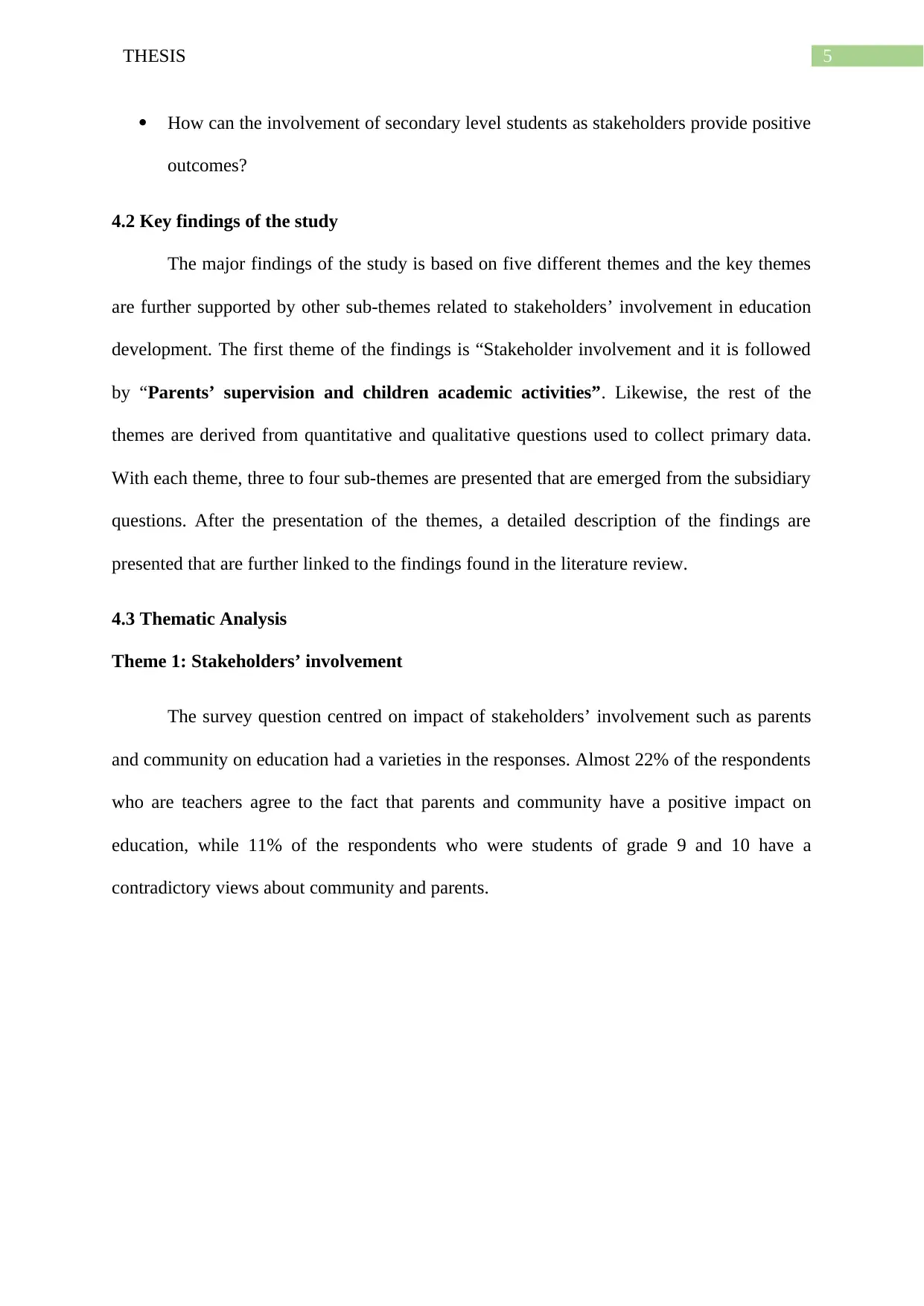
5THESIS
How can the involvement of secondary level students as stakeholders provide positive
outcomes?
4.2 Key findings of the study
The major findings of the study is based on five different themes and the key themes
are further supported by other sub-themes related to stakeholders’ involvement in education
development. The first theme of the findings is “Stakeholder involvement and it is followed
by “Parents’ supervision and children academic activities”. Likewise, the rest of the
themes are derived from quantitative and qualitative questions used to collect primary data.
With each theme, three to four sub-themes are presented that are emerged from the subsidiary
questions. After the presentation of the themes, a detailed description of the findings are
presented that are further linked to the findings found in the literature review.
4.3 Thematic Analysis
Theme 1: Stakeholders’ involvement
The survey question centred on impact of stakeholders’ involvement such as parents
and community on education had a varieties in the responses. Almost 22% of the respondents
who are teachers agree to the fact that parents and community have a positive impact on
education, while 11% of the respondents who were students of grade 9 and 10 have a
contradictory views about community and parents.
How can the involvement of secondary level students as stakeholders provide positive
outcomes?
4.2 Key findings of the study
The major findings of the study is based on five different themes and the key themes
are further supported by other sub-themes related to stakeholders’ involvement in education
development. The first theme of the findings is “Stakeholder involvement and it is followed
by “Parents’ supervision and children academic activities”. Likewise, the rest of the
themes are derived from quantitative and qualitative questions used to collect primary data.
With each theme, three to four sub-themes are presented that are emerged from the subsidiary
questions. After the presentation of the themes, a detailed description of the findings are
presented that are further linked to the findings found in the literature review.
4.3 Thematic Analysis
Theme 1: Stakeholders’ involvement
The survey question centred on impact of stakeholders’ involvement such as parents
and community on education had a varieties in the responses. Almost 22% of the respondents
who are teachers agree to the fact that parents and community have a positive impact on
education, while 11% of the respondents who were students of grade 9 and 10 have a
contradictory views about community and parents.
⊘ This is a preview!⊘
Do you want full access?
Subscribe today to unlock all pages.

Trusted by 1+ million students worldwide
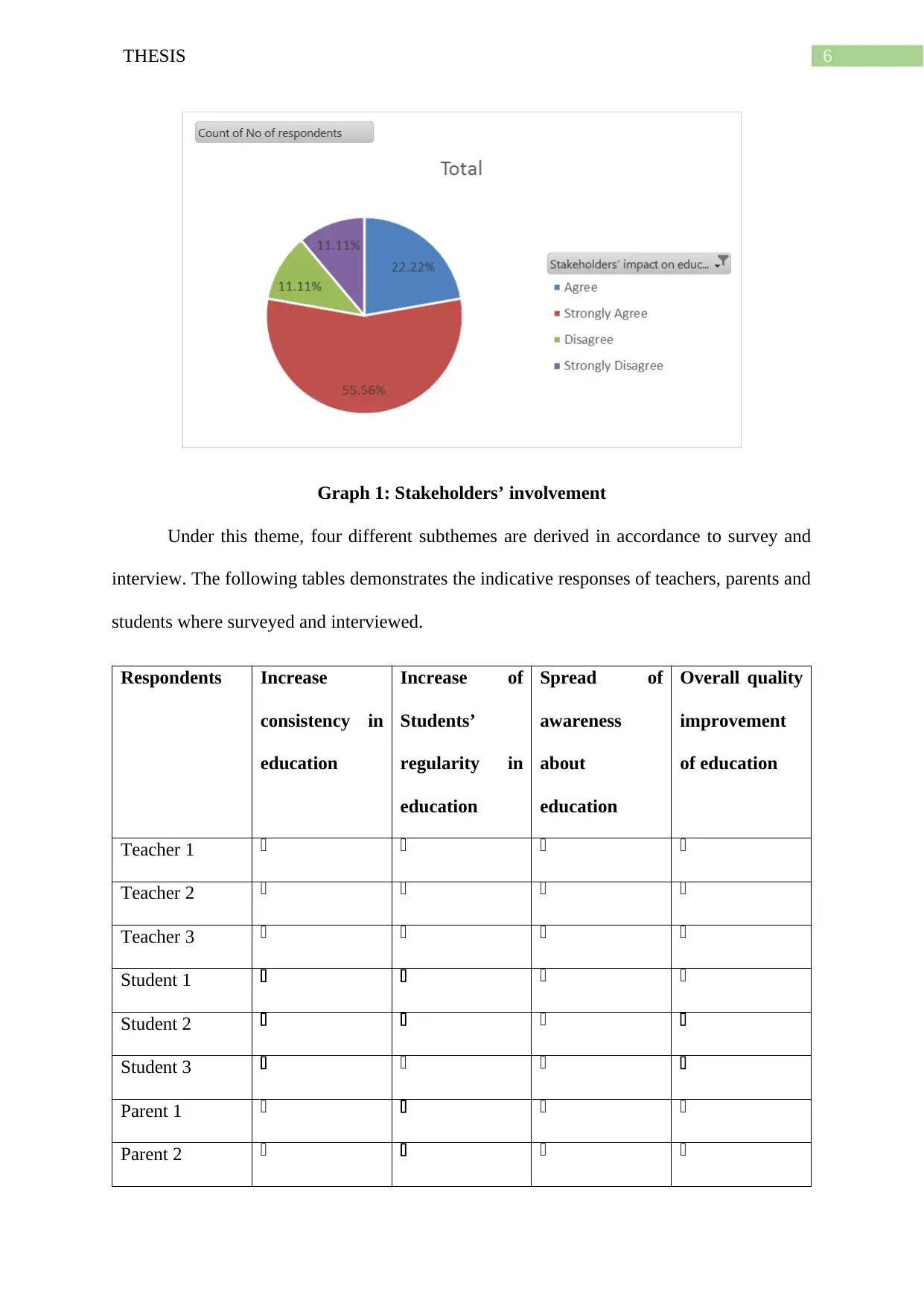
6THESIS
Graph 1: Stakeholders’ involvement
Under this theme, four different subthemes are derived in accordance to survey and
interview. The following tables demonstrates the indicative responses of teachers, parents and
students where surveyed and interviewed.
Respondents Increase
consistency in
education
Increase of
Students’
regularity in
education
Spread of
awareness
about
education
Overall quality
improvement
of education
Teacher 1
Teacher 2
Teacher 3
Student 1
Student 2
Student 3
Parent 1
Parent 2
Graph 1: Stakeholders’ involvement
Under this theme, four different subthemes are derived in accordance to survey and
interview. The following tables demonstrates the indicative responses of teachers, parents and
students where surveyed and interviewed.
Respondents Increase
consistency in
education
Increase of
Students’
regularity in
education
Spread of
awareness
about
education
Overall quality
improvement
of education
Teacher 1
Teacher 2
Teacher 3
Student 1
Student 2
Student 3
Parent 1
Parent 2
Paraphrase This Document
Need a fresh take? Get an instant paraphrase of this document with our AI Paraphraser
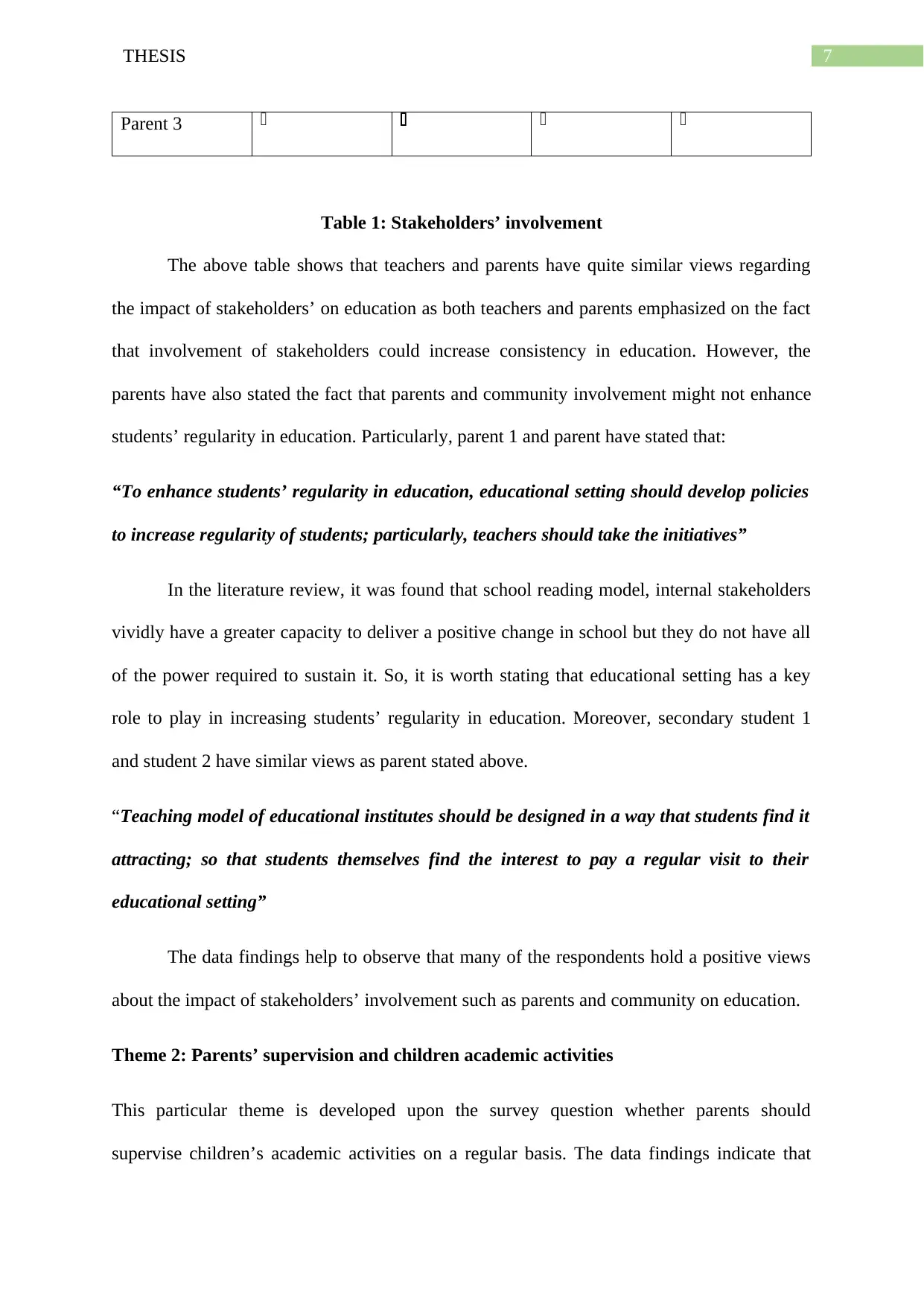
7THESIS
Parent 3
Table 1: Stakeholders’ involvement
The above table shows that teachers and parents have quite similar views regarding
the impact of stakeholders’ on education as both teachers and parents emphasized on the fact
that involvement of stakeholders could increase consistency in education. However, the
parents have also stated the fact that parents and community involvement might not enhance
students’ regularity in education. Particularly, parent 1 and parent have stated that:
“To enhance students’ regularity in education, educational setting should develop policies
to increase regularity of students; particularly, teachers should take the initiatives”
In the literature review, it was found that school reading model, internal stakeholders
vividly have a greater capacity to deliver a positive change in school but they do not have all
of the power required to sustain it. So, it is worth stating that educational setting has a key
role to play in increasing students’ regularity in education. Moreover, secondary student 1
and student 2 have similar views as parent stated above.
“Teaching model of educational institutes should be designed in a way that students find it
attracting; so that students themselves find the interest to pay a regular visit to their
educational setting”
The data findings help to observe that many of the respondents hold a positive views
about the impact of stakeholders’ involvement such as parents and community on education.
Theme 2: Parents’ supervision and children academic activities
This particular theme is developed upon the survey question whether parents should
supervise children’s academic activities on a regular basis. The data findings indicate that
Parent 3
Table 1: Stakeholders’ involvement
The above table shows that teachers and parents have quite similar views regarding
the impact of stakeholders’ on education as both teachers and parents emphasized on the fact
that involvement of stakeholders could increase consistency in education. However, the
parents have also stated the fact that parents and community involvement might not enhance
students’ regularity in education. Particularly, parent 1 and parent have stated that:
“To enhance students’ regularity in education, educational setting should develop policies
to increase regularity of students; particularly, teachers should take the initiatives”
In the literature review, it was found that school reading model, internal stakeholders
vividly have a greater capacity to deliver a positive change in school but they do not have all
of the power required to sustain it. So, it is worth stating that educational setting has a key
role to play in increasing students’ regularity in education. Moreover, secondary student 1
and student 2 have similar views as parent stated above.
“Teaching model of educational institutes should be designed in a way that students find it
attracting; so that students themselves find the interest to pay a regular visit to their
educational setting”
The data findings help to observe that many of the respondents hold a positive views
about the impact of stakeholders’ involvement such as parents and community on education.
Theme 2: Parents’ supervision and children academic activities
This particular theme is developed upon the survey question whether parents should
supervise children’s academic activities on a regular basis. The data findings indicate that
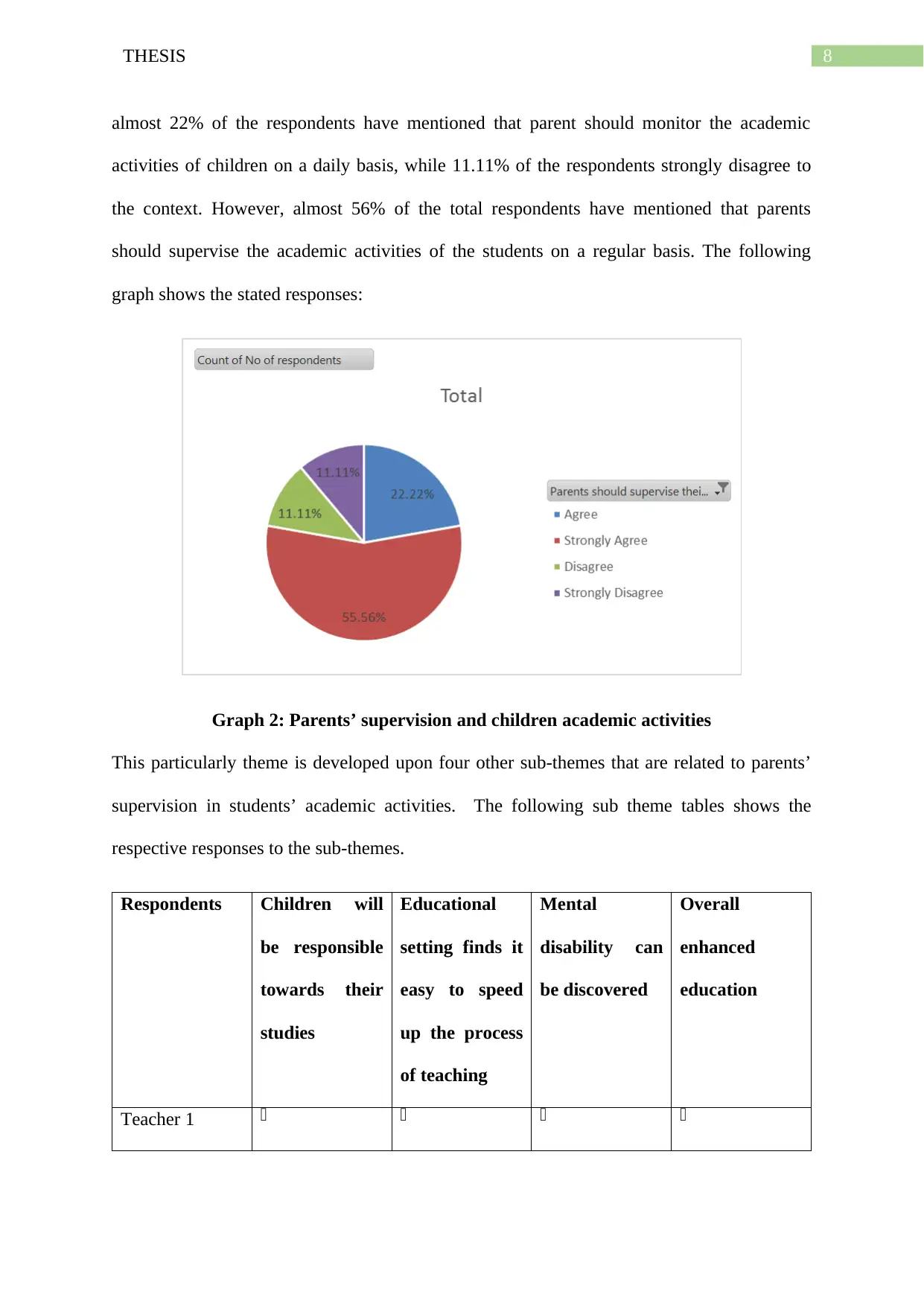
8THESIS
almost 22% of the respondents have mentioned that parent should monitor the academic
activities of children on a daily basis, while 11.11% of the respondents strongly disagree to
the context. However, almost 56% of the total respondents have mentioned that parents
should supervise the academic activities of the students on a regular basis. The following
graph shows the stated responses:
Graph 2: Parents’ supervision and children academic activities
This particularly theme is developed upon four other sub-themes that are related to parents’
supervision in students’ academic activities. The following sub theme tables shows the
respective responses to the sub-themes.
Respondents Children will
be responsible
towards their
studies
Educational
setting finds it
easy to speed
up the process
of teaching
Mental
disability can
be discovered
Overall
enhanced
education
Teacher 1
almost 22% of the respondents have mentioned that parent should monitor the academic
activities of children on a daily basis, while 11.11% of the respondents strongly disagree to
the context. However, almost 56% of the total respondents have mentioned that parents
should supervise the academic activities of the students on a regular basis. The following
graph shows the stated responses:
Graph 2: Parents’ supervision and children academic activities
This particularly theme is developed upon four other sub-themes that are related to parents’
supervision in students’ academic activities. The following sub theme tables shows the
respective responses to the sub-themes.
Respondents Children will
be responsible
towards their
studies
Educational
setting finds it
easy to speed
up the process
of teaching
Mental
disability can
be discovered
Overall
enhanced
education
Teacher 1
⊘ This is a preview!⊘
Do you want full access?
Subscribe today to unlock all pages.

Trusted by 1+ million students worldwide
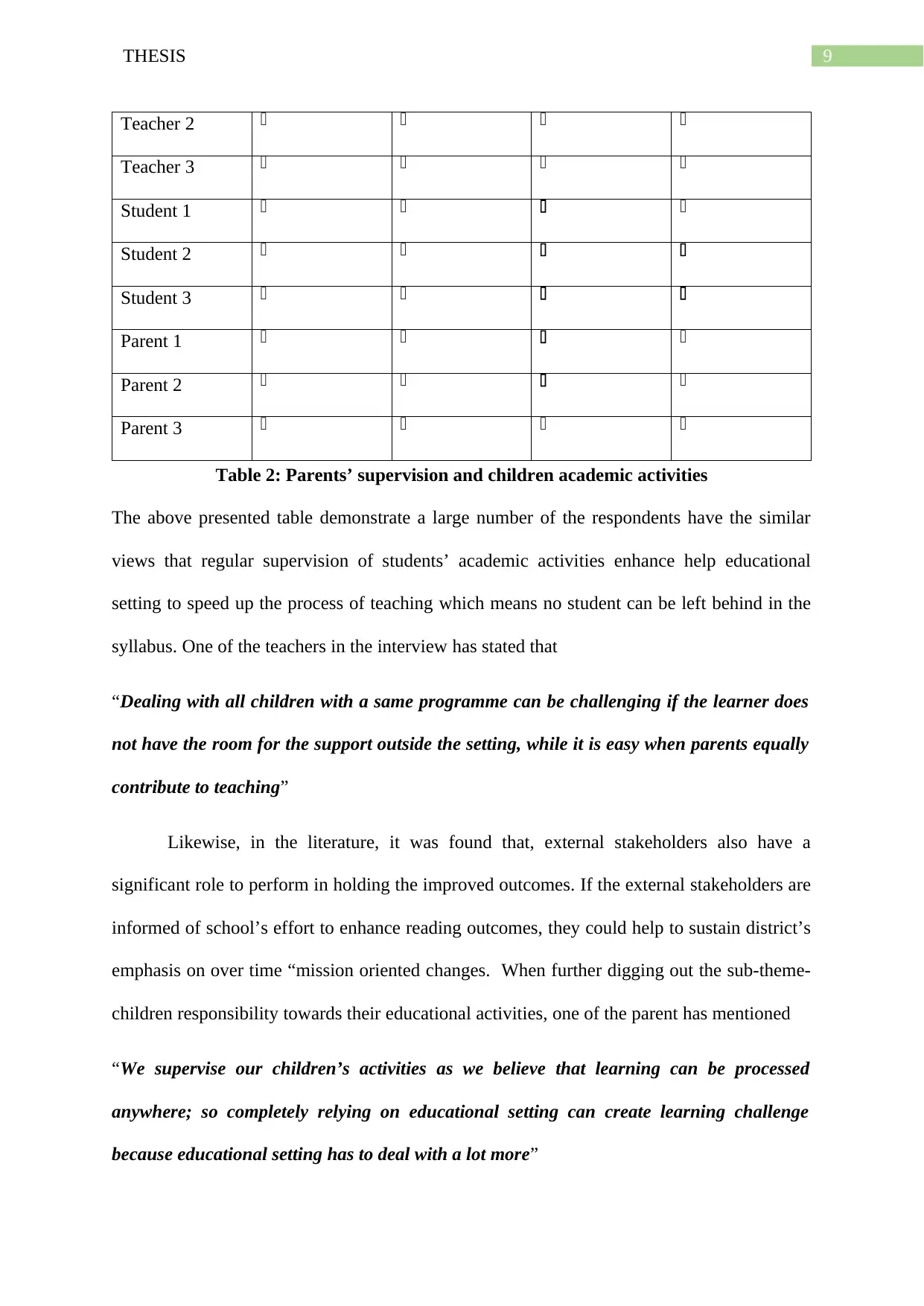
9THESIS
Teacher 2
Teacher 3
Student 1
Student 2
Student 3
Parent 1
Parent 2
Parent 3
Table 2: Parents’ supervision and children academic activities
The above presented table demonstrate a large number of the respondents have the similar
views that regular supervision of students’ academic activities enhance help educational
setting to speed up the process of teaching which means no student can be left behind in the
syllabus. One of the teachers in the interview has stated that
“Dealing with all children with a same programme can be challenging if the learner does
not have the room for the support outside the setting, while it is easy when parents equally
contribute to teaching”
Likewise, in the literature, it was found that, external stakeholders also have a
significant role to perform in holding the improved outcomes. If the external stakeholders are
informed of school’s effort to enhance reading outcomes, they could help to sustain district’s
emphasis on over time “mission oriented changes. When further digging out the sub-theme-
children responsibility towards their educational activities, one of the parent has mentioned
“We supervise our children’s activities as we believe that learning can be processed
anywhere; so completely relying on educational setting can create learning challenge
because educational setting has to deal with a lot more”
Teacher 2
Teacher 3
Student 1
Student 2
Student 3
Parent 1
Parent 2
Parent 3
Table 2: Parents’ supervision and children academic activities
The above presented table demonstrate a large number of the respondents have the similar
views that regular supervision of students’ academic activities enhance help educational
setting to speed up the process of teaching which means no student can be left behind in the
syllabus. One of the teachers in the interview has stated that
“Dealing with all children with a same programme can be challenging if the learner does
not have the room for the support outside the setting, while it is easy when parents equally
contribute to teaching”
Likewise, in the literature, it was found that, external stakeholders also have a
significant role to perform in holding the improved outcomes. If the external stakeholders are
informed of school’s effort to enhance reading outcomes, they could help to sustain district’s
emphasis on over time “mission oriented changes. When further digging out the sub-theme-
children responsibility towards their educational activities, one of the parent has mentioned
“We supervise our children’s activities as we believe that learning can be processed
anywhere; so completely relying on educational setting can create learning challenge
because educational setting has to deal with a lot more”
Paraphrase This Document
Need a fresh take? Get an instant paraphrase of this document with our AI Paraphraser
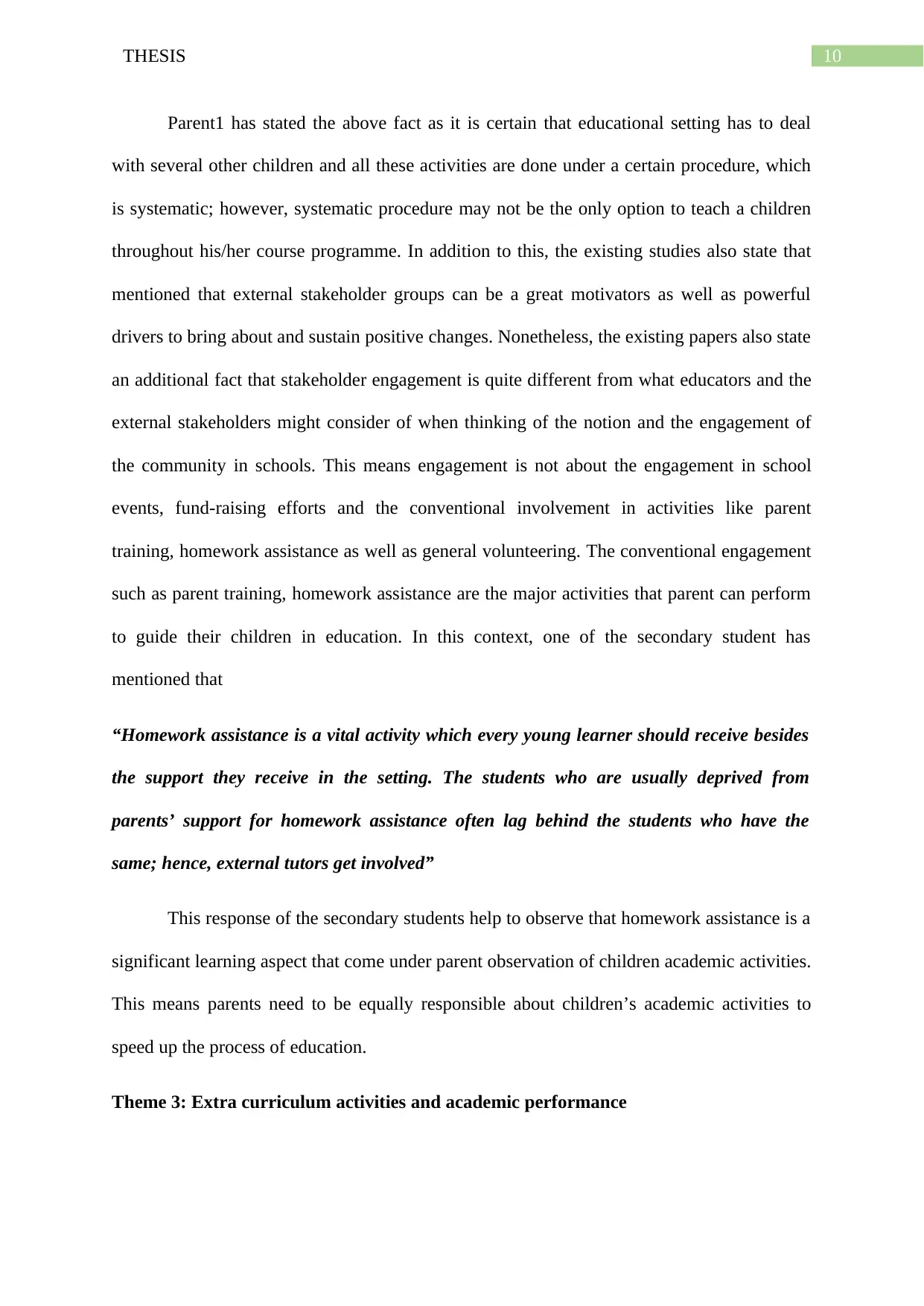
10THESIS
Parent1 has stated the above fact as it is certain that educational setting has to deal
with several other children and all these activities are done under a certain procedure, which
is systematic; however, systematic procedure may not be the only option to teach a children
throughout his/her course programme. In addition to this, the existing studies also state that
mentioned that external stakeholder groups can be a great motivators as well as powerful
drivers to bring about and sustain positive changes. Nonetheless, the existing papers also state
an additional fact that stakeholder engagement is quite different from what educators and the
external stakeholders might consider of when thinking of the notion and the engagement of
the community in schools. This means engagement is not about the engagement in school
events, fund-raising efforts and the conventional involvement in activities like parent
training, homework assistance as well as general volunteering. The conventional engagement
such as parent training, homework assistance are the major activities that parent can perform
to guide their children in education. In this context, one of the secondary student has
mentioned that
“Homework assistance is a vital activity which every young learner should receive besides
the support they receive in the setting. The students who are usually deprived from
parents’ support for homework assistance often lag behind the students who have the
same; hence, external tutors get involved”
This response of the secondary students help to observe that homework assistance is a
significant learning aspect that come under parent observation of children academic activities.
This means parents need to be equally responsible about children’s academic activities to
speed up the process of education.
Theme 3: Extra curriculum activities and academic performance
Parent1 has stated the above fact as it is certain that educational setting has to deal
with several other children and all these activities are done under a certain procedure, which
is systematic; however, systematic procedure may not be the only option to teach a children
throughout his/her course programme. In addition to this, the existing studies also state that
mentioned that external stakeholder groups can be a great motivators as well as powerful
drivers to bring about and sustain positive changes. Nonetheless, the existing papers also state
an additional fact that stakeholder engagement is quite different from what educators and the
external stakeholders might consider of when thinking of the notion and the engagement of
the community in schools. This means engagement is not about the engagement in school
events, fund-raising efforts and the conventional involvement in activities like parent
training, homework assistance as well as general volunteering. The conventional engagement
such as parent training, homework assistance are the major activities that parent can perform
to guide their children in education. In this context, one of the secondary student has
mentioned that
“Homework assistance is a vital activity which every young learner should receive besides
the support they receive in the setting. The students who are usually deprived from
parents’ support for homework assistance often lag behind the students who have the
same; hence, external tutors get involved”
This response of the secondary students help to observe that homework assistance is a
significant learning aspect that come under parent observation of children academic activities.
This means parents need to be equally responsible about children’s academic activities to
speed up the process of education.
Theme 3: Extra curriculum activities and academic performance
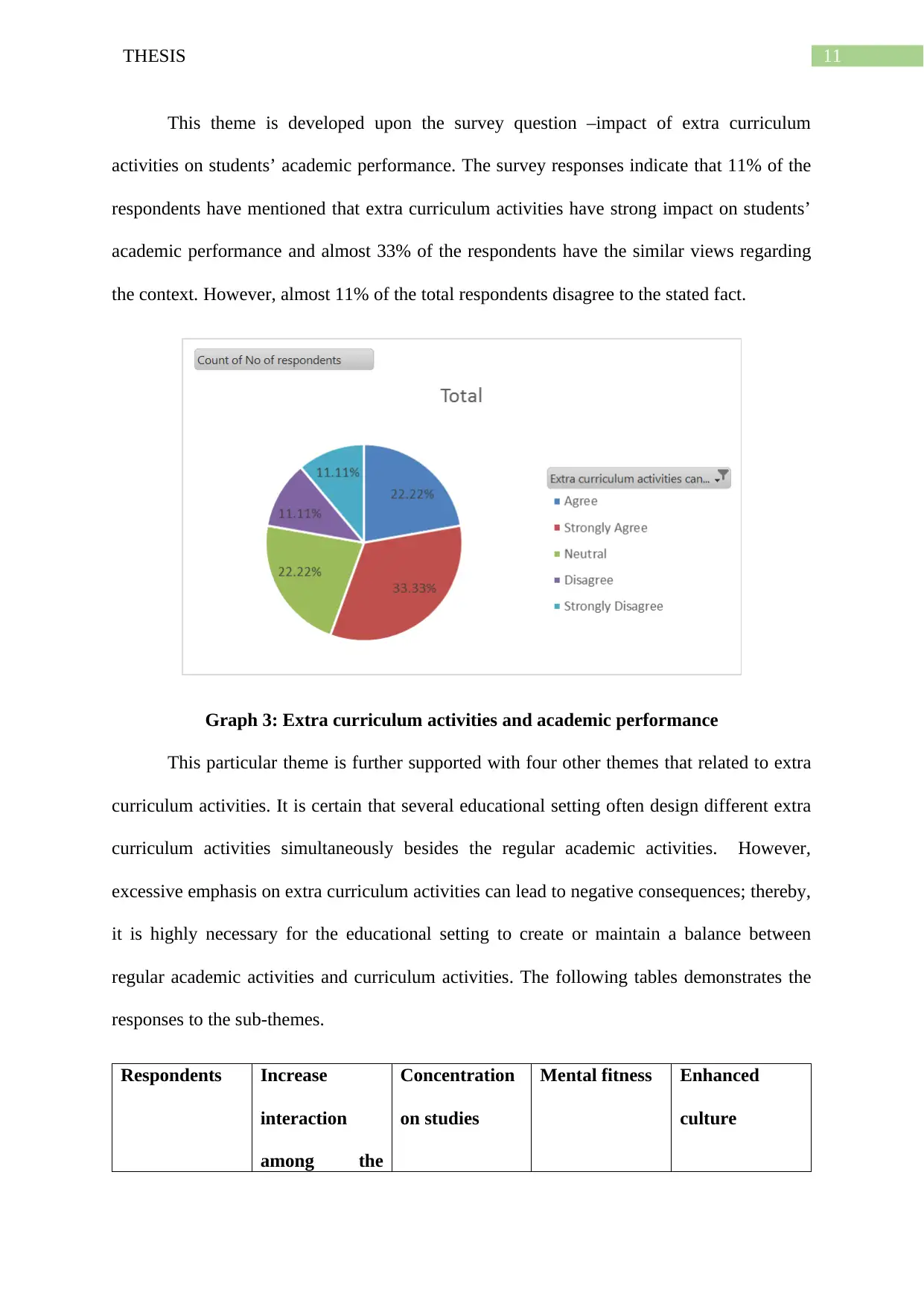
11THESIS
This theme is developed upon the survey question –impact of extra curriculum
activities on students’ academic performance. The survey responses indicate that 11% of the
respondents have mentioned that extra curriculum activities have strong impact on students’
academic performance and almost 33% of the respondents have the similar views regarding
the context. However, almost 11% of the total respondents disagree to the stated fact.
Graph 3: Extra curriculum activities and academic performance
This particular theme is further supported with four other themes that related to extra
curriculum activities. It is certain that several educational setting often design different extra
curriculum activities simultaneously besides the regular academic activities. However,
excessive emphasis on extra curriculum activities can lead to negative consequences; thereby,
it is highly necessary for the educational setting to create or maintain a balance between
regular academic activities and curriculum activities. The following tables demonstrates the
responses to the sub-themes.
Respondents Increase
interaction
among the
Concentration
on studies
Mental fitness Enhanced
culture
This theme is developed upon the survey question –impact of extra curriculum
activities on students’ academic performance. The survey responses indicate that 11% of the
respondents have mentioned that extra curriculum activities have strong impact on students’
academic performance and almost 33% of the respondents have the similar views regarding
the context. However, almost 11% of the total respondents disagree to the stated fact.
Graph 3: Extra curriculum activities and academic performance
This particular theme is further supported with four other themes that related to extra
curriculum activities. It is certain that several educational setting often design different extra
curriculum activities simultaneously besides the regular academic activities. However,
excessive emphasis on extra curriculum activities can lead to negative consequences; thereby,
it is highly necessary for the educational setting to create or maintain a balance between
regular academic activities and curriculum activities. The following tables demonstrates the
responses to the sub-themes.
Respondents Increase
interaction
among the
Concentration
on studies
Mental fitness Enhanced
culture
⊘ This is a preview!⊘
Do you want full access?
Subscribe today to unlock all pages.

Trusted by 1+ million students worldwide
1 out of 24
Related Documents
Your All-in-One AI-Powered Toolkit for Academic Success.
+13062052269
info@desklib.com
Available 24*7 on WhatsApp / Email
![[object Object]](/_next/static/media/star-bottom.7253800d.svg)
Unlock your academic potential
Copyright © 2020–2026 A2Z Services. All Rights Reserved. Developed and managed by ZUCOL.




